Samsung Chromebook (XE303) Review: Testing ARM's Cortex A15
by Anand Lal Shimpi on October 31, 2012 9:00 AM ESTDisplay Quality
The new Chromebook's display is still a fairly mediocre TN panel, but for anyone used to the majority of low cost PC notebooks over the past few years it's really not any different. The 16:9 display measures 11.6 inches along the diagonal with a 1366 x 768 resolution.
Viewing angles are pretty bad. Max brightness tops out at 233 nits, although contrast ratio is better than a lot of low cost notebooks. The low max brightness means that outdoor use will be an issue, generally speaking for really bright sunlight you'll need something closer to 500 nits to be usable.
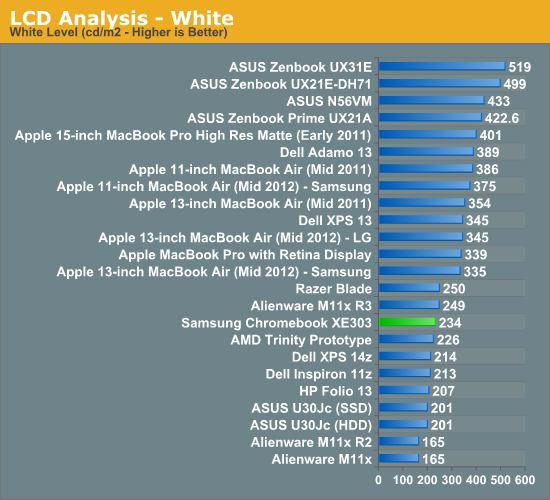
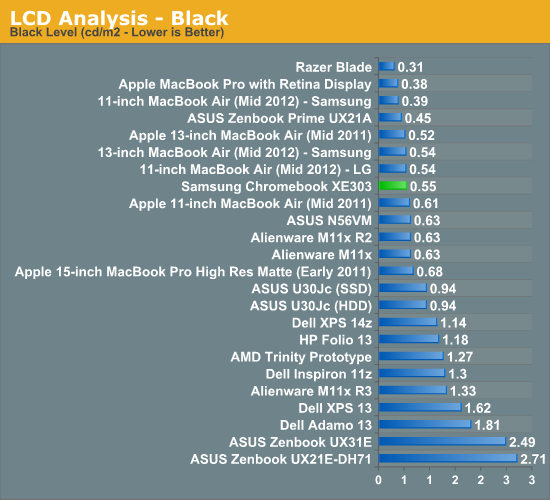
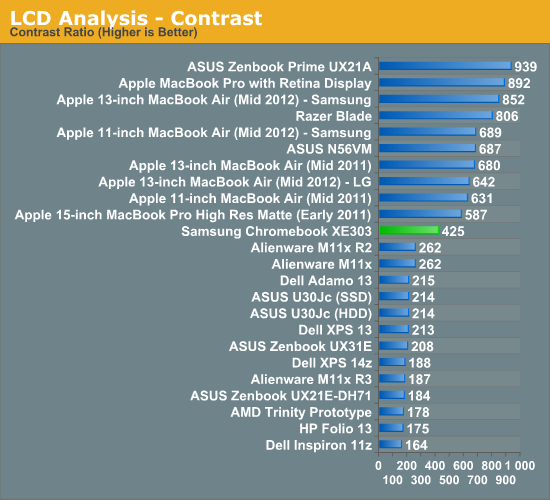
Given the price tag however, the Chromebook's display is passable. What's more bothersome is that PC makers were fine shipping this quality of a display in systems that were 2x the price of the new Chromebook.
Keyboard & Trackpad
The new Chromebook retains the chicklet keyboard that its predecessors introduced. Key feel is a little mushier than I would like but overall the keyboard is pretty good. There's obviously no backlight, which again is a concession Samsung had to make to hit the Chromebook's aggressive price point.
As this is a Chrome OS device there's no Windows/Apple key alternative, just oversized control/alt keys which I really do appreciate.
Chrome OS' keyboard shortcuts do mimic those of OS X. Ctrl + W will close a Chrome tab/window, and more universally ctrl + L will shift focus to the omnibar. There's a row of shortcut keys at the top of the keyboard. Shortcuts include brightness and volume controls, page forward/back and refresh keys, as well as dedicated keys for maximizing the current window and switching between windows (although alt+tab still works for that as well). There's no capslock key, but a dedicated search key in its place. Perhaps Google doesn't want Chromebook users to contribute to overly capitalized YouTube comments.
None of these aspects of the keyboard are new, they've been around since the first Chromebook. There are no dedicated page up/down, home or end keys unfortunately (although alt + up/down will work as a page up/down replacement).
The trackpad is the weaker of the two input devices on the new Chromebook, and even it isn't all that bad. Tracking accuracy is good, and I never had any unintentional taps. The trackpad is actually a clickpad with no discrete buttons. Two fingers on the clickpad will trigger a right click (a two finger tap and click both work). Two finger scrolling is also supported, although there aren't any other gestures. My biggest problem with the trackpad is its click + drag performance isn't all that good. Compared to some of the garbage that has shipped in much more expensive PC notebooks (and Ultrabooks for that matter), Samsung did a good job with the Chromebook.


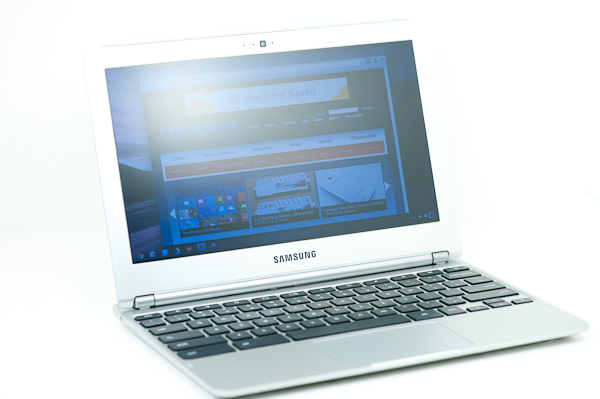
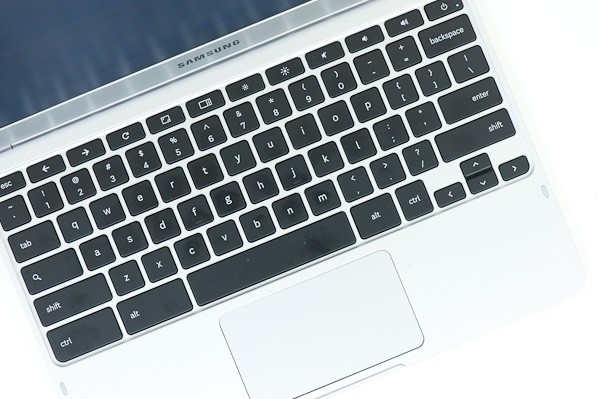








149 Comments
View All Comments
eddman - Thursday, November 1, 2012 - link
What your comment has to do with what I wrote?! I never mentioned anything about smartphones.I just pointed out that you cannot compare an old 45nm chip with a brand new 32nm one, consumption wise.
Then again, just because we haven't seen clover trail on smartphones, doesn't mean it consumes too much power.
Hulk - Wednesday, October 31, 2012 - link
Good quality IPS screen on my next laptop or I stay with my Dell 640m forever.Put a SSD in it recently and I'm totally fine with it.
slackpenguin - Wednesday, October 31, 2012 - link
I keep reading these comments on reviews for this device like "wouldn't some other device be a better value for $250?"How many of you actually go and buy $250 used clunker laptops and are overjoyed with the "value" you just picked up over a 2.5 lb, 0.8 inch, fanless laptop with a warranty?
I haven't seen $250 laptops that come with any "advantage" of a "proper OS". New $250 laptops almost always come with Windows 7 Starter. Used, almost always blank or Windows XP Home. They inevitably either weigh 6 lbs or run a dog slow Atom with 1GB RAM and a 4200 or 5400 rpm drive that is soundly beat by this new Exynos chip setup.
Granted, you can upgrade most any of these clumsy $250 devices talked about for another $40 as Microsoft is desperate for you to use tiles instead of a start menu.
It sounds like most of these comments are from people who would see value in the "Homer Car" over one of those Smart cars. There are plenty of devices out there for you people. This "value" comment is just getting annoyingly repetitive.
eddman - Wednesday, October 31, 2012 - link
You are right about the 250$ range, but with a little more you can get some good stuff.http://www.bestbuy.com/site/Asus+-+14%26%2334%3B+L...
http://www.bestbuy.com/site/Asus+-+15.6%26%2334%3B...
TrackSmart - Wednesday, October 31, 2012 - link
Anand,Why not add a few words comparing this to a standard netbook? $250 sounds like a unique price class, until you hop on Newegg and see that netbooks can be had for similar prices. Here's an 11.6" model for $278 that runs an AMD C60 CPU, 4GB RAM, and 320GB HDD: http://www.newegg.com/Product/Product.aspx?Item=N8...
Key questions worth addressing in the article:
1) Is the Chrome user-experience dramatically better than running Windows on a low-end processor? [Particularly the more efficient Windows 8 platform.]
2) Do the advantages of a lightweight operating system really outweigh the lack of versatility compared to a full-blown OS?
3) Many of us have purchased netbooks as replacements of our parents ancient laptops. Does this Chromebook do a better job than netbooks at meeting basic computing needs?
Krysto - Thursday, November 1, 2012 - link
Yes it is, and Windows 8 is not that much more efficient than Windows 7. Maybe 5% more efficient.TrackSmart - Thursday, November 1, 2012 - link
To clarify, this isn't a "yes" or "no" question that I wanted an answer to. The "answer" depends on your computing needs and what you can afford.I have my own general answers. For my purposes, the Chrome OS is too limited for what I want to do with a laptop-like device. The *concept* of a lightweight operating system that can run on low-end hardware is fantastic. However, the Chrome OS ecosystem is still lacking in features and software availability. Microsoft's RT operating system sounds like it is getting closer to this goal, at least if Anandtech's review is to be believed. We'll have to see if 3rd party software appears to round-out the ecosystem. And the price is still $600 if you want the keyboard cover, so out of this sub-$300 discussion.
On the other hand, a Windows-based netbook can run all of the software I need, but painfully slowly. It's the reason I don't own a netbook and chose to spend more than $300. But if $300 is all you have to spend, and you need something portable that runs all of your productivity software, an 11.6" netbook might be better for you than a Chromebook.
karasaj - Wednesday, October 31, 2012 - link
Does anybody notice that A15 pretty much beats the Z2760 from the Surface review hands down in every way?If only Surface RT had that. But then again that might say just as much about IE versus chrome.
alvinchim - Wednesday, October 31, 2012 - link
Anand: How fast does this boot up? Is it like a smartphone/tablet, instantaneous? Is it like an apple ssd/os, pretty quick? Or like a window 7 SSD watch the screens go by? Or like a windows xp/hd x 7 years old, you might as well sort the laundry, text your girlfriend, and brush your teeth boot? That's a big question, because this really is like a tablet with a keyboard and a bad screen.slackpenguin - Wednesday, October 31, 2012 - link
I keep seeing figures of 10 seconds cold boot, 2 seconds from sleep mode, and 3 seconds off.